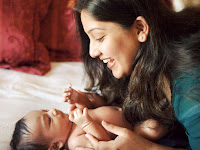Calling all parents again
Dear parents,
I am back again after a long break. Did I sleep too long? Sorry for that.
Just to pick up the strings where we left them, I have re-posted my first letter again. New mothers and fathers can go through it too.
Is your baby now 3 months old
now? Then this letter is for you!
The newborn has now grown into a 'smiley face'
3month old infant.
He is now learning to turn over, hold his head up, look around, search his mother’s face, cry when hungry or uncomfortable, and then smile meaningfully. He looks at dangling colourful toys, tries to reach out and finally grasps it at around 4 months.
Four-month-old infants seem to be
"hatching" socially, as he starts taking more interest in the outer
world. During feeding, infants no longer focus exclusively on the mother but
become distracted.
In another few months he can sit up and crawl. He
notices small objects, tries to pick them with a ‘pincer’ grasp with 2 fingers
and put it in his mouth. By now, he is making a lot of sounds and trying to
communicate with those around. He loves to play with whatever is around by
holding, dropping, poking and mouthing whatever he can lay his hands on.
His attachment for his parents becomes
intense and the preference is also very clear by 4- 5 months. The primary
emotions of anger, joy, interest, fear, disgust, and surprise appear in
appropriate contexts as distinct facial expressions by 4-6 months.
As he progresses along the development ladder, he
is always banking on new stimulation and responses. Each new endeavor is backed
by a cause and effect analysis in the little brain. So, an enriched environment
ensures growth while stressful experiences can impede proper blooming. As a
parent we need to pick up the little one’s cues and respond appropriately and
consistently. Every cue from the baby is like a service at the tennis court, the vigilant player/parent timely returns every single serve/cue.#serve and return technique.
Babies develop attachment right from birth to the
primary care-giver, most often the mother. Her touch, her smell, her voice and
her face evokes a special response in the newborn baby and he responds by
looking into her eyes as she feeds him, or by calming down when held and caressed
by her. This attachment increases as the baby grows and the love and care is
reciprocated by the parents. This reciprocation generates stability in the
baby. Parents who are emotionally available, sensitive, perceptive, and
effective at meeting the needs of their infant throughout the early months of
life are likely to have securely attached infants. Parents who are affectionate
and responsive to the child’s physical and emotional needs, who provide
adequate stimulation, carry a positive attitude, and give adequate emotional
support see their babies grow into stable and sociable individuals. Children’s
secure attachment to caregivers also is associated at a later age with more
effective coping with stress and better performance at school.
During these early months, just as the baby is
developing an attachment, the parents are also getting to understand their baby
and his needs. It is a two way bonding, each strengthening the other. By 3
months of age, the child and parents achieve a synchronized reciprocation
through vocal and affective exchanges. A happy, smiling interactive parent
evokes smiling, cooing, and playfulness in the infant. This is the seed laid
down for effective social reciprocation in later life. Good attachment with
parents provides a secure base, which allows infants to explore their world
with confidence.
This little infant has begun to bloom and is just
learning to explore her immediate environment. Her tiny grip on your finger,
her winning smile, and her squeals will win your heart. What does this little
angel want from you? Your active presence and your milk. So, go ahead with
breast feeding on the baby’s demand and play with her, enjoy her company. She
now has a definite bonding with you and enjoys every smile, every caress every
glance you give her. The more active stimulation she gets in the form of
handling, caressing, feeding, smiling, laughing and singing, the more
responsive she will be. And it is so much fun to see her do something new
almost every other day!
The baby, by now can express his basic emotions,
as we have discussed earlier. He also seeks reciprocation of his
expressions. The infant makes face-to-face behavioral expressions, which
reveal his ability to share emotional states, the first step in the development
of communication. If the parent does not respond, he tries to draw her
attention and engage her and cries angrily if he fails to evoke the required
attention. If this lack of response perpetuates, infants gradually make lesser
efforts to re-engage. Rather than anger, they show sadness and a loss of energy
when the parents continue to be unavailable. This is often seen in infants of
depressed parents or abandoned infants.
Now a busy mother might repent that she is unable
to be with her baby as much as she wants to. No fear dear, babies will accept
separation provided it is predictable and Baby realizes that Mom will be back.
It is consistent availability that matters, not necessarily constant
availability. Little babies are unable to handle unpredictable
circumstances and get frustrated. It is the quality time that she demands. So
please remember the golden rule to be Consistent, Responsive,
Predictable and Comforting (CRPC). Your
lively, animated presence will spark the expressions in the little one and help
her develop newer skills.
For most parents, this is a very happy and
rewarding period of parenting. Don’t you agree?
Enjoy nurturing God’s special gift for you....and if, in the process, you
have any questions for me, mail me at udbhaas@gmail.comI will be back for the baby turning 7 months.
Bye for now,
Dr N Chatterjee
Paediatrician, Udbhaas
#child development #parenting tips #serve and return



















